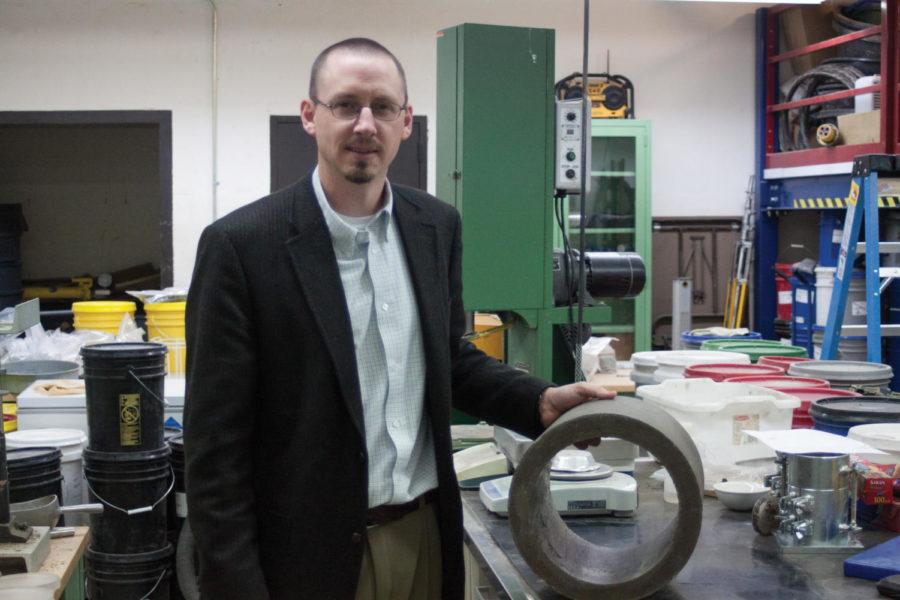Innovative sewer pipe stronger, lighter than traditional concrete
Photo: Ethan Crane/Iowa State Daily
Jason White, professor of engineering, stands next to his new type of sewer pipe made of recycled plastics and fly ash.
December 14, 2012
Iowa State professor David White has a new solution to what has become, over the years, a growing problem in regards to the nation’s predominately concrete-based sewer pipes.
“Concrete sewer pipes have this problem where bacteria that is basically feeding on the sewage material can produce sulfuric acid, which dissolves concrete,” White said.
To combat this predicament, White recalls back to his time about eighteen years ago as an undergraduate student.
“I worked on a research project to figure out ways to use municipal solid waste as part of construction products,” White said.
The research project involved White literally digging through piles of trash to separate the materials. The dirty deed paid off in the end though.
“I discovered that there was a component of the trash that could be converted into a construction material that was both lightweight and stronger than concrete,” White said with his effort contributing to an Iowa State patent at the time in relation to material making.
Jump forward to the present and White has been using this similar knowledge that led to his “polymer mortar composite pipe material and manufacturing method” patent secured on October 25, 2011.
This patented product has plenty of environmental value. The material can be constructed out of recycled and reusable materials, such as plastic bottles, fly ash (coal remains from a power plant), and other plastic fibers.
“One of the interesting things about the pipe, compared to a concrete pipe, is that it’s stronger and lighter,” White said. “We did a study for a full year and we took samples of this [sewer pipe], and a sample of concrete, and put it in a sulfuric acid solution. The concrete completely dissolved in two days, while this had no change all the way through one year.”
While White’s pipe appears to meet, if not exceed, industry durability standards, there are also advantages in manufacturing.
“We’re envisioning that these things can be made in a matter of minutes versus having to let a concrete pipe set up and cure,” White said.
Concrete pipes may take a couple days to solidify and cool to be ready for shipment white White’s material can be made much more quickly.
The production of this particular type of pipe may be slightly more costly on a short-term basis. However, White adds the longevity and value of the pipe would pay off on a more long-term scale.
The innovation has not gone unseen by those in industry. White has recently been in conjunction with the Besser company, an equipment manufacturer in the pipe industry. Their partnership has been focused on gaining new insights into the pipe industry and exploring ways to implement White’s product.
“We would supply the equipment to form the pipe and/or manholes that they want to have tested,” said Denny Anderson, precast sales manager at Besser.
Besser is excited to work with White in developing and manufacturing the sewer pipe.
“Because it is highly corrosion resistant, it will have a high demand in the manhole industry,” Anderson said. “I do believe this product has great potential.”







